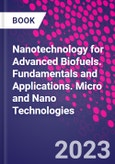Nanotechnology for Advanced Biofuels: Fundamentals and Applications highlights emerging techniques for the formulation of fuels using nanotechnology and bio-based concepts. The addition of high-energy nanoparticles and biologically derived molecules in liquid fuel can increase the potential of energy-rich compounds. Key challenges in the production of nanotechnology-based fuels and their combustion or ignition during the operation are covered, along with the emission of oxidized particles and by-products of incomplete combustion and nano-fuels as an emerging field.
The bio-based energy-rich fuels are largely diffused in conventionally used fuels. The addition of biofuels and nano-additives to pre-existing fuels can offer opportunities for developing modified fuels in domestic industries with the maximum usage of renewable biomass. This is an important reference source for materials scientists, energy scientists and chemical engineers who want to understand more about how nanotechnology can help create more efficient biofuels.
Please Note: This is an On Demand product, delivery may take up to 11 working days after payment has been received.
Table of Contents
1. Biouels: An overview2. Green approaches to blend fuels with nanomaterials
3. Nanomaterials as additives for use in conventional fuels
4. Nanomaterial-bound biocatalysts for fuel synthesis
5. Advanced techniques for the formulation of nano-additive blended fuels
6. Effect of nano-additives on the performance of ignition engines
7. Characteristics and effects on ignition of fuel with nano-sized materials
8. Biomass-derived additives as blends in fuels
9. Nano-formulated biofuels and their performance
10. Non-edible waste bio-based oils as additives in conventional fuels. Magnetic nano-fuels and their performance
11. CNT-based nano-fuels: performance and emission
12. 2D nanomaterials as lubricant additives
13. Graphene quantum dot/nanoplatelets as nano-lubricant additives
14. Metal oxide-based nanomaterials as additives in nano-fuels
15. Rare earth metals and their derivatives as additives in nano-fuels
16. Boron nanoparticles as nano-fuel additives
17. Cerium and aluminum-based nanomaterials as additives in nano-fuels
18. Radiation-mediated combustion of nano-fuels and its effects
19. Applications of nano-fuels in automobiles and industries
20. Effects of nano-fuel additives to reduce total emissions
21. Toxicity and hazardous effects of nano-additives in fuels
22. Adverse effects, on respiratory and nervous systems, of nanosized additives in fuel
23. Technical challenges and practical viability (Nano-fuels stability and durability)
24. Economy aspects and future visions








